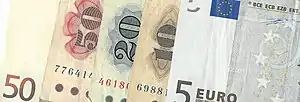Fireproof banknote
Fireproof banknote is a demonstration of putting a banknote, previously soaked in 50% (v/v) alcohol fuel solution, to a flame. The fire is lit and later extinguished by itself without the banknote being burnt.[1] This demonstration can be used to teach about the fire triangle and classes of fire.[1]

Explanation
A 50% (v/v) alcohol solution is composed of 50% alcohol and 50% water in which water acts as a solvent.[2] By igniting a paper banknote completely soaked with 50% alcohol solution, the alcohol (which is the fuel in the fire triangle) is combusted into carbon dioxide and water vapour. On the other hand, water is heated up with some being evaporated as it absorbs energy from the combustion of alcohol.[2] The evaporation of water helps cool down the system, so not all water is evaporated and the paper banknote is not burnt. The water to alcohol ratio should be 50% or higher; a lower ratio leads to the banknote being slightly burnt because there is not enough water to absorb the combustion energy and cool down the system.[2]
CnH2n+1OH(aq) + (3n/2) O2(g) → n CO2(g) + (n+1) H2O(g)[1][2]
Common alcohol fuels for this experiment can be methanol (n=1),[2] ethanol (n=2)[1] and both isomers of propanol (n=3).[2] The fire lit in this scenario is categorized as a class B fire (fire from flammable liquids), while the fire from burning paper (banknote) is categorized as class A.[1] The alcohol-water mixture flame can be hard to detect, so sodium chloride can be added to give the flames an orange-yellow color.[1][3] For safety purpose, a water tray should be prepared for emergency use in case a paper banknote caught a fire, and flammable and combustible materials should not be kept or put near the flame.[1]
Alternative materials or setups
Other materials
Euro banknotes are recommended since it is made of paper and it is legally permitted to artistically mutilate it or burn in small amounts.[4] Moreover, there are no depictions of any persons on the banknotes.[1]
Aside from banknotes, a similar experiment can be performed by using towels,[2] paper[5] or exam paper.[6]
No material
A solution of about 50% fuel alcohol and 50% water can catch on fire and extinguish itself in a "burning water" demonstration.[7] In contrast to the subsection above, this can be done in a glassware without any absorbing materials like banknotes, towels, or paper.
Gallery
- A video of fireproof banknote experiment
- A video of fireproof banknote experiment
- A video of fireproof banknote experiment
References
- Limpanuparb, Taweetham; Sathainthammanee, Dulyarat; Pakwilaikiat, Pooh; Kaewpichit, Chatchapong; Yimkosol, Warangkana; Suwannakhan, Athikhun (2021). "Reinterpreting Popular Demonstrations for Use in a Laboratory Safety Session That Engages Students in Observation, Prediction, Record Keeping, and Problem Solving". Journal of Chemical Education. 98: 191–197. doi:10.1021/acs.jchemed.9b00474. S2CID 216354702.
- Shakhashiri, B. Z. (1983). Chemical Demonstrations, Vol. 1: A Handbook for Teachers of Chemistry. Madison, WI: University of Wisconsin Press. pp. 13–14.
- "Money to Burn". Royal Society of Chemistry. Retrieved 17 Aug 2021.
- "The European Commission. Commission Recommendation of 22 March 2010 on the Scope and Effects of Legal Tender of Euro Banknotes and Coins (2010/191/EU)". Official Journal of the European Union. 30 Mar 2010. Retrieved 20 Aug 2021.
- Chen, P.S. (1974). Entertaining and Educational Chemical Demonstrations. Chemical Elements Publishing Co. p. 53.
- Jardin, John; Murray, Peter; Tyszka, Jennifer; Czarnecki, Julian (1978). "Setting Exams on Fire". Journal of Chemical Education. 55 (10): 655. doi:10.1021/ed055p655.1.
- Summerlin, L. R. (1988). Chemical Demonstrations: A Sourcebook for Teachers, 2nd ed. Washington, DC: American Chemical Society. p. 6.
- "Boil Water in Paper Bag". Science4Fun. 19 December 2014. Retrieved 17 Aug 2021.